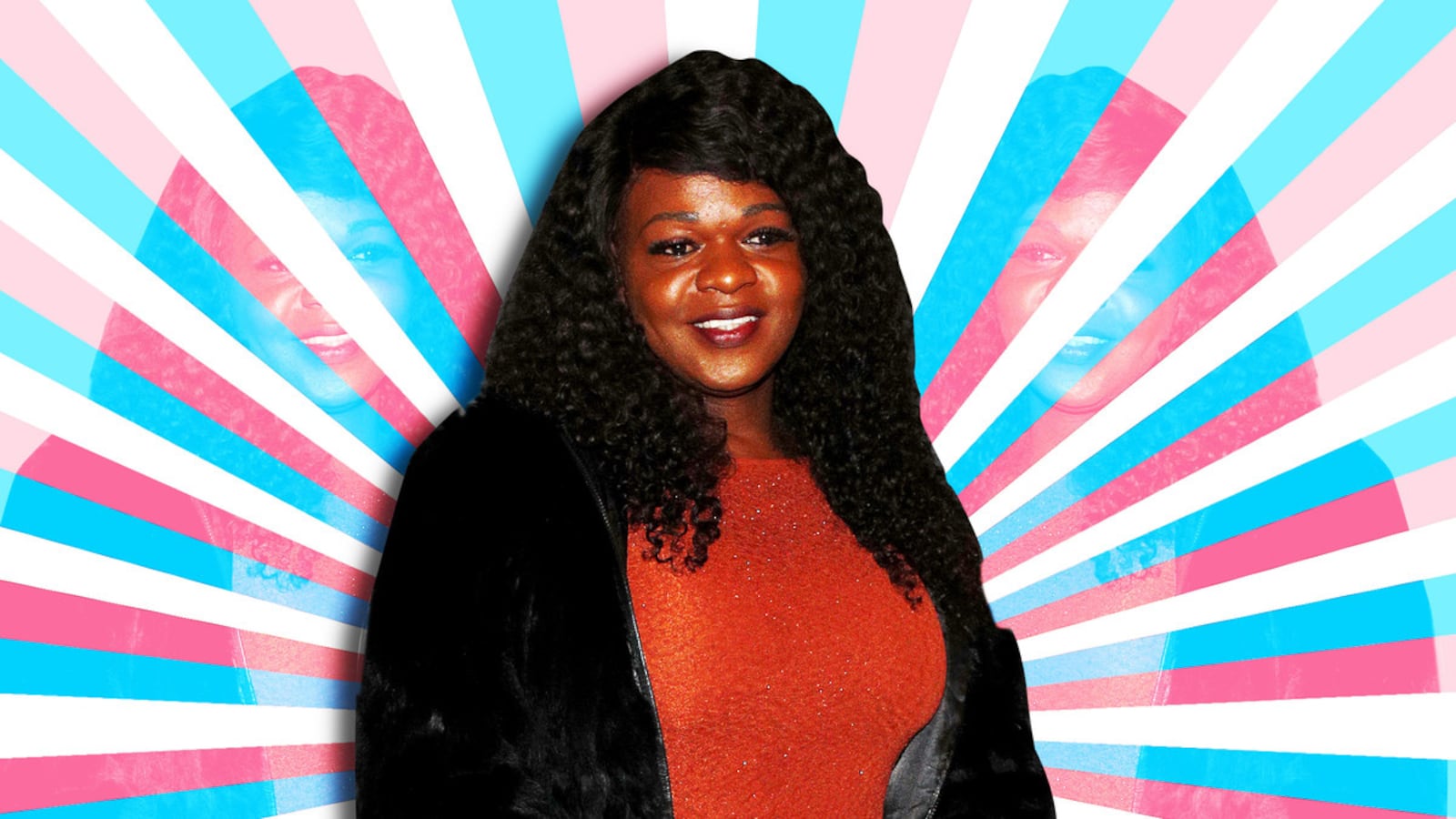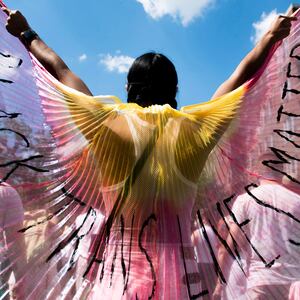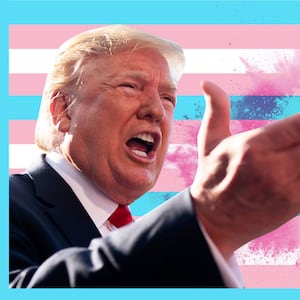Kayla Gore’s initial idea was to build some single residential units in the garden of My Sistah’s House, which provides emergency housing for trans and gender nonconforming (TGNC) people in Memphis, and which predominantly serves trans women of color. Gore, the organization’s co-founder and executive director, wanted these so-called “tiny homes” to be temporary safe spaces to be used while residents found full-time homes.
Then Gore had another idea: to build a small community in Memphis with 20 homes to house trans women of color, who, said Gore, are at higher risk of violence and discrimination when attempting to access housing.
The land on which to build those homes has now been found next to the Loosahatchie River, and Gore and her colleagues are presently selecting a supplier for building materials. At the time of writing, $253,391 has already been raised from a GoFundMe campaign (with a goal of $450,000), and Gore imagines the community being as self-sustaining as possible—with farming and a retreat staffed by residents.
The award-winning Gore, who is also the Southern Regional Organizer at the Transgender Law Center, knows what her trans clients need; this deeply committed activist says fighting prejudice and for positive change is, for her, intensely personal. “It feels like my life experiences got turned into some kind of degree—I became a subject matter expert in so many different situations.”
Gore, 34, grew up in Memphis, and has lived there most of her life. Her mother works in the service industry; her father was not present in her life. She has two older brothers and two younger brothers. “Growing up was difficult here, being a Black and queer child. There are not too many opportunities afforded to people like us in our social class. Growing up I realized I was whatever people said I was very, very young. Those feelings were suppressed because of my upbringing and my extended family’s relationship to religion.”
Gore herself attended a Baptist church for five or six years, which was less accepting “and more don’t ask, don’t tell,” she said. “Even though I was feminine, they didn’t associate that with being gay. They associated it with me being a pretty boy.” At school, Gore was bullied, mostly verbally—apart from a few occasions, such as when she had a desk thrown at her by one of her tormentors.
“The bullying was always homophobic. It was never associated with my transness because back then that was not a term we had. Today, you have more trans young people who can identify with it. Back then, we didn’t have role models like Laverne Cox, for us to say, ‘Oh, that’s how I identify.’”
She knew she was trans from a young age. “It was how I felt. I knew it was true regardless of what my body looked like. I always felt my internal organs would reveal I am, and I have always been, a woman. I knew I was in the wrong body.”
Gore’s behavior became more rebellious, especially towards the male figures in her life. “I didn’t feel people respected me as a woman,” she said. Her behavior led her mother to connect her with a therapist, who she saw from 12 to 15. “It was not useful. The underlying issues of gender dysphoria were never talked about in a positive way. Now that I work in advocacy, I look back on it and think of it as conversion therapy.
“My mother didn’t know that at the time. She has always been extremely supportive. The therapist was always trying to reiterate my assigned gender, trying to get me to ‘understand’ that I was a boy. They were not trying to affirm me in the space I was in at that moment, but trying instead to guide me to the destination they thought I should be at.”
The younger Gore never felt suicidal, sought support from friends, and—always independent—relied on herself. Indeed, she wanted from a young age to work at a nonprofit, working to help others in a setting not founded on profit.
Gore began her transition while living in Phoenix, Arizona, aged around 20, while in a relationship with a man whose family did not know that he was in a relationship with a trans woman. Gore—ambitious and keen to build a life for herself—had moved to the city having accepted a job offer which was then rescinded. She is not sure if that happened because she was trans; no reason was given.
Suddenly having no income meant she could not afford her rent, and she became homeless. Her partner was also experiencing homelessness, and showed Gore how to sleep rough as safely as possible—in hotels, and rooms within public bathrooms.
Gore went to visit a friend in Chicago, and texted her partner, not realizing his phone had been taken by his brothers who discovered that Gore was trans. When she returned to Phoenix, they ambushed her and beat her up. Her then-partner participated in the beating, but seemed—to Gore—to be trying to get in the way of his brothers’ violence and facilitate Gore’s escape.
His nickname was K3, she said, which meant “he could knock people out with three punches,” which Gore had seen him do. Gore knew she had to leave the abusive relationship. She moved back to Memphis, and while still homeless, felt “so much more comfortable” in herself as a trans person.
“I felt a totally different feeling,” said Gore. “It was so isolating initially. A lot of the friends I had were no longer friends. I was not accepted in a lot of spaces I had previously been welcomed in. But what had changed was the comfort I felt in myself. I felt a whole new feeling of pride. I was trans, and that’s what people could finally see. When I identified as gay, people associated me with being Black and feminine, not being gay or part of the LGBTQ community. But when I transitioned, my euphoria and pride was written all over my face. I didn’t get to take it off. I didn’t want to take it off.”
Most liberating initially was identifying openly as trans on social media platforms, “which was like a revealing curtain. People finally knew. I remember having conversations with friends I hadn’t seen in a while, and those conversations were confirmations of things they had heard but hadn’t seen me in a while.”
There was also unwelcome attention, from a man who rode the same bus as her, pre- and post-transition, and made a huge fuss on the bus about her looking so good and so much changed. It felt embarrassing and exposing. “I was like, ‘I’m going to have to get a car.’”
Gore changed her name legally, and accessed hormones and surgeries. “All of those things and none of those things made a difference. There was not one specific thing that led me to feel ‘Oh I’m trans now.’ It was really just me getting knowledge of other people’s transness and associating their transness with my transness.”
Gore struggled to find work once back in Memphis. Prior to her transition she had waited tables, but now no-one would hire her. Being homeless, needing somewhere to live, and having to provide for herself led Gore to do “survival sex” on the streets, off and on, for the next five years.
“Initially, I felt safe, comfortable, and empowered. I was making money. I was strict about what people did and didn’t do to my body. Then it became dangerous and risky. Over time, I noticed a first round of clients who dated trans women, and particularly hit on the girls who were new. The second round of guys also dated trans women, but more sporadically. The third round of guys watch, and making sure the new girl isn’t police. Those ones caused me the most harm and danger.”
In her advocacy now, Gore hears stories of deep mistrust between trans women, particularly Black trans women, and the police. “There’s no trust on either side, and I relate their stories to my own experiences. I think about how long they have been doing sex work, and how long I was.
“The state and systems are not designed to protect us. In a lot of situations when trans people call the police, we are somehow turned from victim to suspect. If we are doing survival sex, calling the police impedes our ability to do sex work because they turn us into some kind of criminal. There is a strong possibility of us going to jail, rather than the person causing us harm—so we don’t call the police in those circumstances, and those men in that group know that.”
Gore used “a tough exterior” as a sex worker, which she would use when a knife or gun was pulled on her—as with one client, from that third group of male clients Gore identified, who had had sex with her, paid her, then took the money back.
“He robbed me, and he had a .38 revolver to my head. I sat there, tough as nails, and said, ‘You’re going to shoot me in your car? My blood will be all over your car. You want people to know I was sitting in your car?’ He wanted to put me out in a dark alley. I said he wasn’t going to do that, and demanded he take me back to a well-lit place, where there were cameras.
“I said, ‘You’re going to shoot me in your car, or take me back to where I came from.’ I had read stories of situations like this, I kept contemplating how it could play out. I thought he would understand if I explained that he wouldn’t want people to know he had used sex workers, or have to explain why there was blood all over his car.”
“I was terrified,” Gore recalled. “Afterwards, I said to myself, ‘Girl, are you crazy? What if that had been a stolen car?’ I escaped it unscathed. There are a lot of Black trans women who can’t tell those stories today.” Today, Gore cannot always bear to read the many stories of the murders of, and violence against, Black trans women; it’s too painfully relatable.
“It was the advocacy of being visible.”
One evening, Gore and another sex worker decided to eat at a 24-hour diner. However, the staff wouldn’t serve them and asked them to leave. “Walking out of the restaurant that night was my first step out of sex work,” said Gore. Leaving the diner, Gore saw a notice saying the diner was hiring. “Tired” of survival sex, Gore applied. The next day she was interviewed by the diner’s manager, and was hired on the spot. The manager didn’t know Gore was trans, as her dead-name, which Gore was still using, was “fairly unisex.”
When Gore was working there, some trans sex workers came into the diner, and were again refused service. Gore said to the manager, “You know I’m trans?” The manager said she didn’t and apologized. “I explained to this cis white woman that it was dangerous for those girls, and that they came into the diner seeking refuge more often than seeking actual food.
“I said that the diner was a sanctuary, and that they could be fleeing for their lives. If they felt they were not welcome, they would carry on running into the dark, which wasn’t safe. The manager changed her mind, and allowed the girls to stay.”
Gore did many part-time jobs, including at a bar on the city’s famous Beale Street and at Memphis’ FedEx Forum, and particularly liked serving the public, even though—as her bosses told her—she was a supervisor and didn’t have to.
“I felt like I was knocking down doors for other trans men and women,” said Gore. “It was the advocacy of being visible. Super visible! They called me ‘Lashes.’ There were lines of guys waiting to get a beer from me, and I kept wondering if they knew I was trans. I wanted people to know there was a trans person working in the building.”

Kayla Gore at Memphis Pride Fest in September 2017, where she was one of the Grand Marshals.
Courtesy Kayla GoreGore has worked in the advocacy field full-time for around five years, first at OUTMemphis, where she re-crafted all the trans-related programming, launching new groups and a booklet of trans services and spaces in the city. Gore served on the Tri-State Black Pride Board as the TGNC Chair from 2016 to 2018, and is the current Chair of the Tennessee Transgender Task Force with the Tennessee Department of Health.
At TLC, her advocacy is on behalf of all trans people living in the South. Gore is also active in the organizing of Black Trans Circles, which develops the leadership of Black trans women in the South and Midwest “through the creation of healing justice spaces to work through oppression-based trauma and incubate community organizing efforts to address anti-trans murder and violence.”
Gore doesn’t consider the impact of her work, or its trickle-down effects, as she does it. “I don’t look at something like ‘This is changing lives, or saving lives, or how huge it is until it is blowing up.’ I’m focused on what I’m doing, or the next thing.” She laughed. “I’ll wait until my retirement, then sit back and write the memoir, and think, ‘I did that!’”
Gore’s family learned about her homelessness or sex work through interviews she has given. “I’m a Virgo, self-sufficient. I was raised to be independent. I took pride in supporting myself and others. My relationship with my family is good. My mom has always supported me, and is proud of me, and comes with me to award ceremonies like when I won the James Award from Planned Parenthood (in 2018).”
Gore likens being Black and trans in the South to the effect when a supermarket closes down in an under-served community. “Activists call these places ‘food deserts.’ That’s what it’s like being Black and trans in the South. It feels like being in a desert because of the lack of access to services, but we do have access to barriers to overcome. And just like in a desert, you think you see a solution to something, or change, and it turns out to be a mirage.
“A lot of things are rooted in bigotry, hence the ‘bathroom bills,’ and the overwhelming, constant barrage of inequality and injustices. While it makes me as mad as fuck, it also fuels my activism and visibility. People need to know somebody is defending them and fighting for them.”
Gore is inspired by other trans campaigners like Gavin Grimm, who sued his school board over restrictions to his bathroom access at high school. “I get horrible messages, and trolls,” said Gore. I get depressed, but it also makes me continue the work I do.”
“Have we really moved the needle? People are still dying daily,” Gore said. She hopes that by the time of her retirement, “we will be well on the way to liberation, and I will stand proud of what we have achieved. I hope by that time we have not just etched away at systemic oppression, but actually erased the hell out of it, like a lot of Black trans folks been erased. We are not there yet, but we are getting there—ending the systems of oppression that are killing us.”
Gore said one solution in combatting the violence committed against Black trans sex women is to fund and support those people who work with those women directly, and who are willing to look at their clients holistically.
While heartened by the groundswell of support for Black Trans Lives Matters, Gore is weary of seeing white-led nonprofits “plagiarizing and mimicking” the language and fundraising methods of Black-led organizations, “and because they have larger platforms, we look like the plagiarists. The same thing happened to (famous trans activists) Marsha P. Johnson and Sylvia Rivera.”
Although the 250,000-plus dollars raised for the new trans housing project is brilliant, Gore also notes how nonprofits’ work is often only visible or recognizable when connected to “the dollar. To eliminate that we need people to truly invest in Black trans futures, not just as a fad. We need to hold people accountable who are causing harm. The solutions should be victim-centered, but it should not up to the person who has been harmed to figure them out.”
Everyday racism means that Gore is ready, when walking down the street, to expect disdain from white people, she said. But experiencing anti-trans prejudice from Black people “is very cutting. It is more invalidating than when white folks do it. We look exactly alike. At the end of the day, ‘they’ are coming for all of us. We have to band together.”
She understands the prejudice. “It is nuanced and complicated,” she said. The same goes for the solutions. “It is rooted in all of us, including us trans folks. I haven’t always identified as trans. Within the queer, gay, community I was in, trans people were ridiculed. I ridiculed trans people before I knew that was how I identified. We are not invited into these spaces unless we have a ‘passing’ privilege. When you are invited into those spaces it is carefully and with moderation. It is all rooted in transphobia.”
Gore recalled asking a room of queer people who in the room was transphobic? Inevitably there was silence. “Yes, we are,” Gore told the room. “We were programmed that way.” She paused. “I don’t think we will be liberated until we figure out all the different layers, and it needs to be concerted change—not just a trend.”
“It will be our own little community.”
Gore started My Sistah’s House in 2017. It has four bedrooms and two baths, and just an acre of grounds. The idea for the larger development near the river came after a number of LGBTQ people approached Gore for assistance during the COVID crisis, with Gore recognizing how ill-served the LGBTQ community was in Memphis when it came to safe spaces.
“I thought, ‘What if we get the county to donate us land, so we can build houses for trans people?’ They can be homeowners, and never have to worry about rent again. The idea is they can live there for as long as they want. It will be our own little community.”
This seems especially important, with the anti-trans toxicity swirling around the comments of J.K. Rowling and her supporters, which, for Gore, “indirectly contribute to the harm and violence we experience. It makes us realize how it is often well-resourced people and entities behind a lot of negative legislation, which seeks to criminalize or stigmatize us for how we show up in the world.”
Rowling’s focus on the young is especially pernicious, said Gore, seeking to delegitimize their trans identities when they are most in need of support and affirmation. “Shame on her,” said Gore. “Our lives are very real and very valid. She should know her words mean a lot to her followers. It sends out a message that she has disdain for us, and her rhetoric puts a lot of people’s lives in danger.
“Young trans people would love her support. I know trans kids who have brought her books to support groups. They were a comfort zone for them when they were lonely and afraid. For the person behind these books to feel the way she feels, and to say what she says‚ I think it’s bullying. I think J.K. Rowling is being a bully. Those ‘feminists’ supporting her are not feminists on so many levels. I would say to them, ‘Don’t label yourself something you’re not because it tarnishes someone who actually is a feminist.’”
The Trump administration’s anti-trans animus “cannot hinder” the advancement of trans rights at city and state levels, said Gore. “It’s important to focus on the presidential election, but we should not forget the local elections and ballot initiatives which seek to harm and hinder folks in smaller communities.”

Kayla Gore, front, with Yasmyne Hunter beside her, and then behind, l to r, Jennine Bell, Quinton Bell, and TC Caldwell.
Courtesy Kayla GoreTrans candidates need more financial support in their bids for public office; Gore is not ready for such a run at the moment. “You need a name to be able to run here,” said Gore. She is speaking cautiously, just like a politician; her own name is becoming better known, alongside her successful activism—and she doesn’t rule out a political future.
Gore welcomes the recent Supreme Court decision, ruling that current sex discrimination law covers LGBTQ people too. But it only benefits those in work, said Gore, and not those “who can barely get a job in a warehouse, earns barely a minimum wage, has no benefits or healthcare—and if a box falls on you it falls on you.”
The trans military ban is “horrendous,” said Gore, especially for trans folks who are from military families, who wanted to serve their countries, and are now prevented from doing so, or having to closet themselves if they are presently serving, not out, and frightened of being “found out” and thrown out.
The erasure and invalidation of trans peoples’ identities in planned policies in healthcare and education are “awful,” said Gore, because if a trans person cannot go to a hospital and be called the correct name, or be misgendered, “they are not likely to stay for whatever treatment they need.”
To relax, Gore loves gardening, and is very proud of My Sistah’s House’s raised beds of jalapeño, cabbage, tomatoes, and cantaloupe. This week, at a candlelit ceremony, she and the residents dedicated a newly built koi pond to the victims of anti-trans violence.
Despite her public profile and campaigning, Gore said she was also an introvert, never happier than when spending weekends in bed with snacks and episodes of Real Housewives, Married to Medicine, and Insecure—the latter sometimes feeling so spookily close to Gore’s own life “that it’s like Issa Rae has a camera somewhere above me.” Gore is dating someone, and while “past the infatuation stage” is still keeping all options open. She wants to begin to write fiction.
But Gore’s work is all-encompassing. Those vegetables being grown in My Sistah’s House’s garden are used in meals delivered to sex workers, along with “survival kits” containing pepper spray, combs, and condoms. Talking about the planned new riverside community, she hopes it will also be a place where older trans folks can live and not be isolated.
Her work means a lot to her, this reporter said.
“Oh yes it does,” said Gore. “Not monetarily—it does not add up. But seeing people’s lives change—even coming from something as simple as changing their name—is wonderful. Things like this change the trajectories of people’s lives, and I get to see it.”




